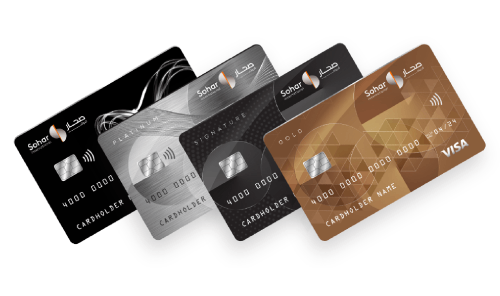- Retail Banking
- Accounts and deposits
- Loans
- Insurances
- Cards
- Global transfers & Non Resident Banking
- Sohar rewards
- Digital banking
- Global Market
In the midst of a significant digital shift in the global financial landscape, banks such as Sohar International stand at the forefront, driving a strategic transformation in Oman's corporate financial sphere through advanced platforms and services.
The banking industry stands on the cusp of profound digital transformation. The 2023 Financial Access Survey by the International Monetary Fund highlighted the widespread increase in access points for digital financial services, resulting in a notable surge in both the quantity and scale of digital financial transactions. This trend aligns with the Top 10 Emerging Banking Trends of 2024, emphasizing the transformative influence of technology in reshaping security measures, operational efficiency, and the overall customer experience within the banking industry.
This shift is pertinent for businesses of all sizes – small, medium, and large. For banks, it necessitates a nuanced understanding of their clientele within a flexible ecosystem that integrates cutting-edge technological advancements. Core modernization, interoperability, and integration play critical roles in aligning with this corporate digital evolution.
Digital Corporate Banking
The payment sector is rapidly evolving in Oman and globally, driven by emerging technologies that are reshaping payment methods, transfers, and savings and investment decisions. In Oman, there is a clear and rapid trend among banking sector consumers and businesses, favoring electronic means of transfer over traditional cash and cheques.
Looking at Automated Clearing House (ACH) transactions, both volume and value have consistently grown. In just five years, the volume has increased over 2.5 times from 7.2 million transactions in 2018 to 18.5 million transactions in 2022. A similar trend of 2.5 times growth can be observed in the value of ACH transactions, rising from RO 4.7 billion in 2018 to RO 11.5 billion in 2022. This transformation underscores the dynamic shift towards digital transactions in Oman.
So, what does this mean for banks?
The imperative for digital transformation in corporate banking is driven by the need for banks to swiftly adapt to changing customer demands and market dynamics. Banks are compelled not only to differentiate their offerings but also to pioneer innovative solutions that attract and retain corporate clients, enabling them to manage and grow their businesses. Banks strategically investing in digital tools gain a distinct advantage, positioning themselves as market leaders in an era where adaptability and technological prowess are paramount for corporate success.
Staying relevant
The Central Bank of Oman (CBO) recognizes the immense potential of technology in shaping the future of finance and is committed to fostering an environment that embraces innovation while safeguarding its citizens' interests. One such initiative is the introduction of the PSP licensing framework, establishing clear guidelines and standards for payment service providers. This framework promotes transparency and accountability, creating a competitive marketplace benefiting both businesses and consumers. From a corporate banking perspective, the CBO directed all banks operating in the country to use online methods for salary transfers instead of traditional means.
In wholesale banking, digital platforms have become indispensable tools, revolutionizing traditional processes. These technological assets not only streamline operations but also provide real-time information, enhancing transparency and expediting decision-making
Adopting Corporate Banking Solutions
Offering access to advanced financial tools, the Sohar International Unified Transaction Banking platform is a prime example. It empowers businesses with unprecedented financial flexibility and control, delivering robust banking solutions encompassing cash and liquidity management, and trade finance-related services. Operating through an exceptionally efficient, seamless, and secure channel, the platform significantly enhances client’s financial operations, delivering heightened efficiency.
Catering to the diverse needs of government and corporate clients, the platform goes further by offering various payment options, automated reconciliation of collections, participation in digitized trade finance transactions, and access to a digital ecosystem connecting vendors and customers within a supply chain framework. This comprehensive approach fosters greater collaboration and transparency in business interactions.
Adding to its versatility, the unified digital transaction-banking platform allows users to execute transactions either through web access or by seamlessly integrating with an ERP system using a ready-made Host-to-Host integration solution. Complementing that is the added convenience provided by Sohar International’s corporate mobile app, designed to empower designated executives to remotely approve transactions, thereby enhancing flexibility and responsiveness.
Sohar International's platform distinguishes itself in the industry through flawless integration and bespoke solutions, offering corporations a more efficient means of managing payables and receivables. The bank's digital prowess has earned widespread recognition among clients, spanning both small and medium enterprises (SMEs) and larger corporate entities, resulting in a notable surge in the platform's adoption, marked by the successful onboarding of numerous new corporate clients.
Embracing innovation, investing in cutting-edge tech like blockchain and AI, and tailoring solutions for evolving client needs are imperative. Let us lead the charge toward a future where seamless, personalized digital banking defines success. The time to act is now, shaping a future where innovation drives corporate banking enabling new heights of success and customer satisfaction.

 05-28-2025
05-28-2025 05-28-2025
05-28-2025 05-21-2025
05-21-2025